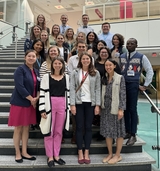Pharmacy Residency Programs


The Department of Pharmacy Services at Children’s Hospital of Philadelphia offers a one-year PGY1 Pharmacy Residency Program, and a one-year PGY2 Pediatric Pharmacy Residency Program. Learn more about the programs, requirements, and expectations.
- PGY1 Pharmacy Residency Program: The post-graduate year 1 (PGY1) residency is designed to effectively enable the new practitioner to develop a solid foundation in problem solving and decision-making skills in multiple aspects of pharmaceutical care.
- PGY2 Pediatric Pharmacy Residency Program: PGY2 Pediatric Pharmacy Program: The purpose of the PGY2 Pediatric Pharmacy Program is to cultivate future leaders in pediatric pharmacy practice. Pharmacists completing this residency will master the principles of pediatric pharmacotherapy and be competent and confident pediatric practitioners capable of providing direct patient care in various pediatric subspecialties. PGY2 Pediatric Pharmacy Program graduates will understand the principles of a sound pediatric pharmacy operational system and be able to integrate these principles into their clinical practice. These pharmacists will be skilled in educating other health care professionals, patients, pharmacy students, and the community on pediatric medication-related issues and will be capable of conducting basic clinical research to answer medication-related questions in the pediatric population. They will demonstrate professional maturity by following a personal philosophy of practice, monitoring their own performance, exhibiting commitment to the profession, and exercising leadership in improving the safety of the medication-use system.
- PGY1/PGY2 Combined Corporate Pharmacy Administration and Leadership Residency Program: The purpose of the combined PGY1/PGY2 Corporate Pharmacy Administration and Leadership (CPAL) residency provided by CHOP, in partnership with Cencora is to build upon a PGY1 residency graduates’ competence (following completion of the PGY1 Program at CHOP) in the delivery of patient-centered care and in pharmacy operational services to prepare residents who can assume high level managerial, supervisory, and leadership responsibilities. This combined residency program will provide residents with opportunities to experience and build knowledge in safe and effective medication-use systems, quality assurance and improvement, the development of strategic sourcing initiatives utilizing clinical expertise, the use of advanced literature analysis skills, the management of human resources, the management of financial resources, use of technology, and advanced leadership. Residents who successfully complete an accredited combined PGY1/PGY2 Corporate Pharmacy Administration and Leadership residency will have a strong foundation for continued growth in management and leadership skills, preparing them for a clinical or operational management/supervisory role in a variety of work settings.
- Pharmacy Residency Handbook and Policies
The residency programs are designed using the American Society of Health-System Pharmacists' (ASHP) Residency Standards, and utilize the goals and objectives designed within this program.
View the slideshow for a look at our facilities and a sample of some of the technology used in our department.

Meet our team
The Department of Pharmacy Services residency programs are led by clinical pharmacy specialists with expertise in a wide range of pediatric pharmacologic areas. Residents will work with preceptors specializing in all facets of patient pharmaceutical care from general medicine to highly specialized intensive care units.
Scholarly activities: teaching commitments
The clinical pharmacists at CHOP coordinate classes in various disciplines at area universities, including:
- “Pediatric Pharmacotherapy” at Wilkes University Nesbitt School of Pharmacy, Wilkes-Barre, PA
- "Pediatric Pharmacotherapy” at Jefferson School of Pharmacy, Philadelphia, PA
The clinical pharmacists also serve as guest lecturers at several Schools of Pharmacy, including:
- Saint Joseph’s University Philadelphia College of Pharmacy, Philadelphia, PA
- Thomas Jefferson University College of Pharmacy, Philadelphia, PA
In addition, our clinical pharmacists conduct unit-based education of physician trainees and other multidisciplinary staff, including nurses, respiratory therapists, registered dieticians, etc. and are responsible for a series of American Council on Pharmaceutical Education (ACPE) accredited clinically oriented CE programs provided to the entire pharmacy staff.

Resources for professionals
We have curated resources to support your professional development, including how to join our Pharmacy team at CHOP.
An Inside Look at CHOP Pharmacy
Watch this video to learn how the Department of Pharmacy Services at Children's Hospital of Philadelphia is providing the best possible pharmaceutical care to pediatric patients.







